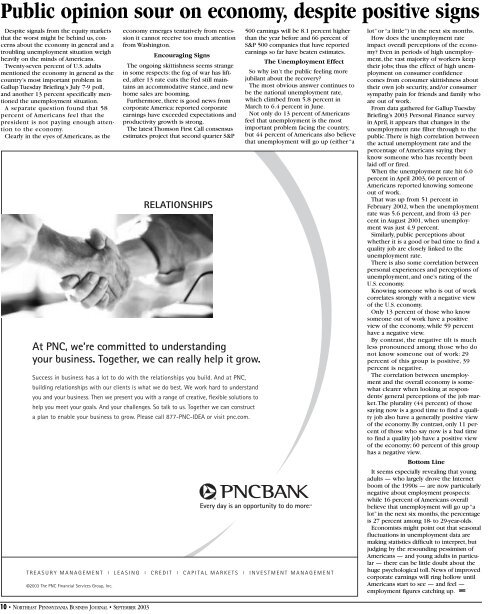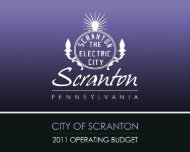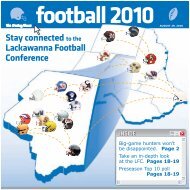racetracks
I want to be left alone! - The Times-Tribune
I want to be left alone! - The Times-Tribune
- No tags were found...
Create successful ePaper yourself
Turn your PDF publications into a flip-book with our unique Google optimized e-Paper software.
Public opinion sour on economy, despite positive signs<br />
Despite signals from the equity markets<br />
that the worst might be behind us, concerns<br />
about the economy in general and a<br />
troubling unemployment situation weigh<br />
heavily on the minds of Americans.<br />
Twenty-seven percent of U.S. adults<br />
mentioned the economy in general as the<br />
country’s most important problem in<br />
Gallup Tuesday Briefing’s July 7-9 poll,<br />
and another 13 percent specifically mentioned<br />
the unemployment situation.<br />
A separate question found that 58<br />
percent of Americans feel that the<br />
president is not paying enough attention<br />
to the economy.<br />
Clearly in the eyes of Americans, as the<br />
10 • NORTHEAST PENNSYLVANIA BUSINESS JOURNAL • SEPTEMBER 2003<br />
economy emerges tentatively from recession<br />
it cannot receive too much attention<br />
from Washington.<br />
Encouraging Signs<br />
The ongoing skittishness seems strange<br />
in some respects: the fog of war has lifted,<br />
after 13 rate cuts the Fed still maintains<br />
an accommodative stance, and new<br />
home sales are booming.<br />
Furthermore, there is good news from<br />
corporate America: reported corporate<br />
earnings have exceeded expectations and<br />
productivity growth is strong.<br />
The latest Thomson First Call consensus<br />
estimates project that second quarter S&P<br />
RELATIONSHIPS<br />
At PNC, we’re committed to understanding<br />
your business. Together, we can really help it grow.<br />
Success in business has a lot to do with the relationships you build. And at PNC,<br />
building relationships with our clients is what we do best. We work hard to understand<br />
you and your business. Then we present you with a range of creative, flexible solutions to<br />
help you meet your goals. And your challenges. So talk to us. Together we can construct<br />
a plan to enable your business to grow. Please call 877-PNC-IDEA or visit pnc.com.<br />
500 earnings will be 8.1 percent higher<br />
than the year before and 66 percent of<br />
S&P 500 companies that have reported<br />
earnings so far have beaten estimates.<br />
The Unemployment Effect<br />
So why isn’t the public feeling more<br />
jubilant about the recovery?<br />
The most obvious answer continues to<br />
be the national unemployment rate,<br />
which climbed from 5.8 percent in<br />
March to 6.4 percent in June.<br />
Not only do 13 percent of Americans<br />
feel that unemployment is the most<br />
important problem facing the country,<br />
but 44 percent of Americans also believe<br />
that unemployment will go up (either “a<br />
TREASURY MANAGEMENT I LEASING I CREDIT I CAPITAL MARKETS I INVESTMENT MANAGEMENT<br />
©2003 The PNC Financial Services Group, Inc.<br />
lot” or “a little”) in the next six months.<br />
How does the unemployment rate<br />
impact overall perceptions of the economy?<br />
Even in periods of high unemployment,<br />
the vast majority of workers keep<br />
their jobs; thus the effect of high unemployment<br />
on consumer confidence<br />
comes from consumer skittishness about<br />
their own job security, and/or consumer<br />
sympathy pain for friends and family who<br />
are out of work.<br />
From data gathered for Gallup Tuesday<br />
Briefing’s 2003 Personal Finance survey<br />
in April, it appears that changes in the<br />
unemployment rate filter through to the<br />
public.There is high correlation between<br />
the actual unemployment rate and the<br />
percentage of Americans saying they<br />
know someone who has recently been<br />
laid off or fired.<br />
When the unemployment rate hit 6.0<br />
percent in April 2003, 60 percent of<br />
Americans reported knowing someone<br />
out of work.<br />
That was up from 51 percent in<br />
February 2002, when the unemployment<br />
rate was 5.6 percent, and from 43 percent<br />
in August 2001, when unemployment<br />
was just 4.9 percent.<br />
Similarly, public perceptions about<br />
whether it is a good or bad time to find a<br />
quality job are closely linked to the<br />
unemployment rate.<br />
There is also some correlation between<br />
personal experiences and perceptions of<br />
unemployment, and one’s rating of the<br />
U.S. economy.<br />
Knowing someone who is out of work<br />
correlates strongly with a negative view<br />
of the U.S. economy.<br />
Only 13 percent of those who know<br />
someone out of work have a positive<br />
view of the economy, while 59 percent<br />
have a negative view.<br />
By contrast, the negative tilt is much<br />
less pronounced among those who do<br />
not know someone out of work: 29<br />
percent of this group is positive, 39<br />
percent is negative.<br />
The correlation between unemployment<br />
and the overall economy is somewhat<br />
clearer when looking at respondents’<br />
general perceptions of the job market.The<br />
plurality (44 percent) of those<br />
saying now is a good time to find a quality<br />
job also have a generally positive view<br />
of the economy. By contrast, only 11 percent<br />
of those who say now is a bad time<br />
to find a quality job have a positive view<br />
of the economy; 60 percent of this group<br />
has a negative view.<br />
Bottom Line<br />
It seems especially revealing that young<br />
adults — who largely drove the Internet<br />
boom of the 1990s — are now particularly<br />
negative about employment prospects:<br />
while 16 percent of Americans overall<br />
believe that unemployment will go up “a<br />
lot” in the next six months, the percentage<br />
is 27 percent among 18- to 29-year-olds.<br />
Economists might point out that seasonal<br />
fluctuations in unemployment data are<br />
making statistics difficult to interpret, but<br />
judging by the resounding pessimism of<br />
Americans — and young adults in particular<br />
— there can be little doubt about the<br />
huge psychological toll. News of improved<br />
corporate earnings will ring hollow until<br />
Americans start to see — and feel —<br />
employment figures catching up.




